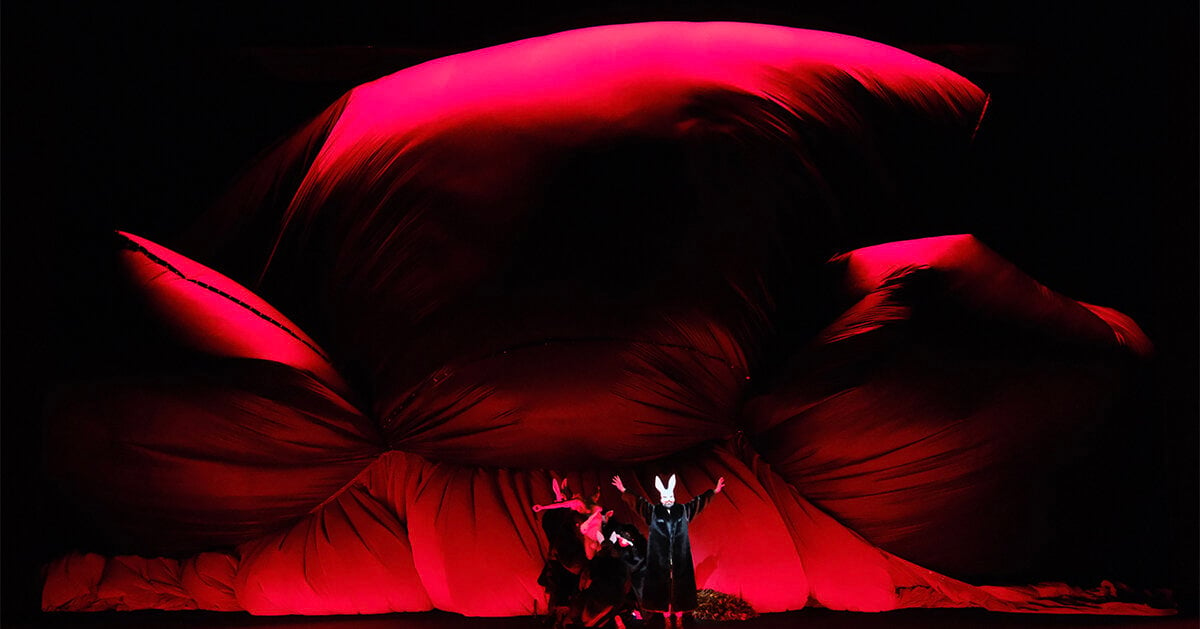numen/for use and ivana jonke’s dynamic rigoletto set design
Spanish theater director Miguel Del Arco joined forces with art collective Numen/For Use and architect Ivana Jonke to orchestrate a dynamic and immersive set for the new production of Rigoletto at Teatro Real in Madrid. The story of Rigoletto is drenched in darkness, depravity, and ultimately tragedy. It traces the life of a lowly court jester who works at the court of Mantua, run by a cocky Duke who boasts of his long list of lovers and humiliates his subordinates. While typically playing cruel jokes on the duke’s ‘victims’, Rigoletto’s world comes crashing down when Gilda, his daughter, attracts his master’s attention. The story’s tragic storyline is ultimately reflected in the creation of sinister, lynchian spaces, imbued with a strange and relentless dynamism. The ‘red set’ (ducal palace) plays with unexpected manipulations of the theater curtain while the ‘black set’ (exterior) conjures up a dark and inhospitable landscape with a hidden hortus clausus. All scenes retain a dose of visual abstraction paired up with emphatic organicism and vitality of inflatable forms.
Numen/ For Use and Ivana Jonke’s scenography for Rigoletto | all images courtesy the art collective
how red & black curtains collapse & inflate across acts
The first Act of Rigoletto at Teatro Real begins with an extended staging of the collapse of the main theater curtain by Numen/For Use (see more here) and Ivana Jonke. What initially appears as a common red velvet curtain suddenly drops before the audience, revealing the front side of a huge inflated cube lined sidewise with black fabric. As the Preludio music intensifies, the cube collapses and deflates dramatically, while the curtain plunges backward to form an open red landscape covering a large portion of the stage. Chandeliers descend and the scene is set for the ball sequence. The scene concludes with the red fabric sucked out of the stage, revealing only the black, hilly terrain that slowly moves towards the proscenium. The chandeliers retreat and the landscape fills with haze to create a somber, predatory exterior.
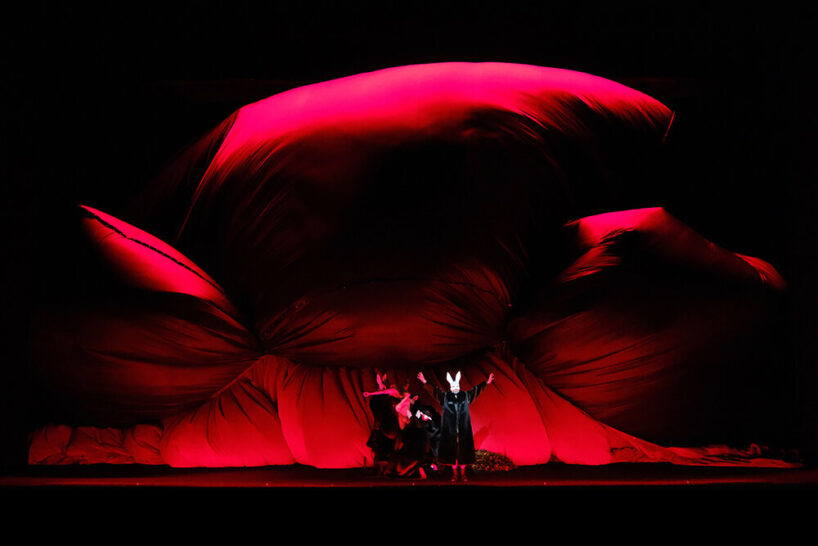
Act 1 – the red curtain turns into a huge inflated cube
At some point in the scene, a slit in the terrain opens and a transparent foil cupola appears containing a hortus clausus, wildly planted with forest fern and meadow grasses. This is Gilda’s locked garden which she shares with several forest nymphs, acting as her untamed, elusive doubles. The lush garden is green and well-lit, in sharp contrast with the dystopian, dead environment around it. The whole scene has a sense of terraforming a distant, inhospitable planet. The cupola is air supported and quickly collapses for Gilda’s scene, leaving the garden unprotected and open to invasion. During the last part of Act 1, six large black boulders inflate laterally and in the back of the terrain, creating an even wider and more threatening landscape.
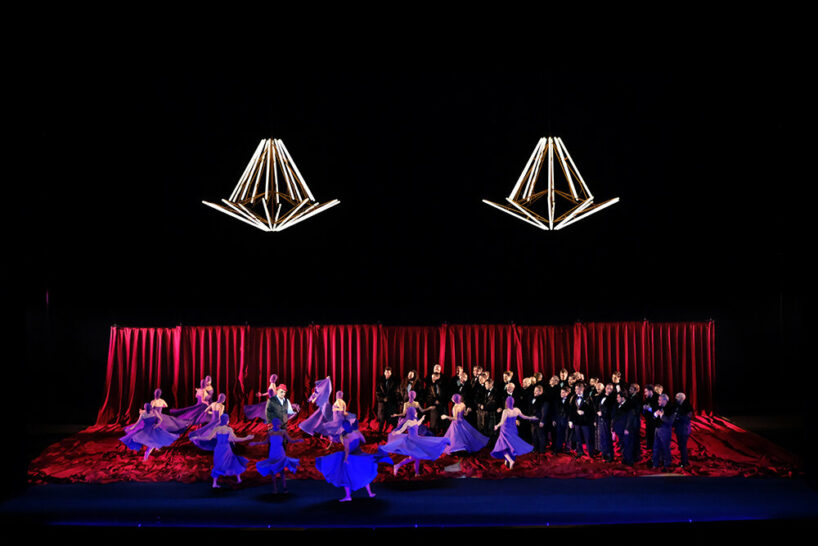
Act 2 – unveiling pillar-like cutouts
For the start of Rigoletto’s Act 2, instead of going up, the curtain disintegrates into pillar-like cutouts that slide backward into the depth of the stage and assume the spatial composition of a great hypostyle hall. This is the classical ducal palace scene, Numen/For Use points out. The chandeliers return, and a white sofa emerges with a trick of the moving curtain. Despite this scene being structurally different from the opening palace scene, the art collective set up a clear visual connection between the two. At the end of Act 2, the pillars become warped, and the palace assumes a chaotic, jungle-like character. The scene closes with the curtain pillars slowly straightening up and moving in the opposite direction until they form an even surface and completely close the portal.
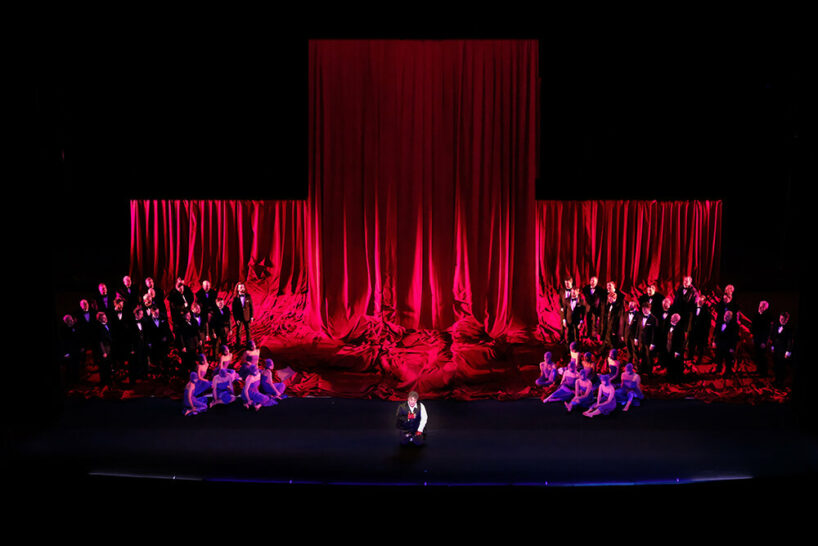
Act 2 – assuming the spatial composition of a great hypostyle hall
creating surreal, dark, and sinister landscapes at teatro real
Act 3 starts again with the closed red curtain, which opens through segments falling down to reveal a cave-like environment formed by suspended, organic masses of dark fabric. In one of the cave openings, the audience glimpses a dimly lit tavern. This is a warm subterranean space, a loud den of the social underworld, with shadows moving on the walls. The tavern is alive and intense yet surrounded by the river mists and murky landscape. The spatial elements for the interior are realistic, while the rest of the scenery remains shrouded in abstract organicism. ‘With Gilda’s murder, the fly system will release and lower all of the suspended fabric, the cave will fold down and disappear in the slow avalanche of black cloth. In the ‘maledizione’ scene, Rigoletto and dead Gilda are left among the ruins of the set and the exposed structures of theatre technology,’ concludes the art collective. Numen/For Use custom designed most of the furniture and all contracting chandeliers. The performance premiered on December 2, 2023, and ran for 30 consecutive nights until January 2, 2024.
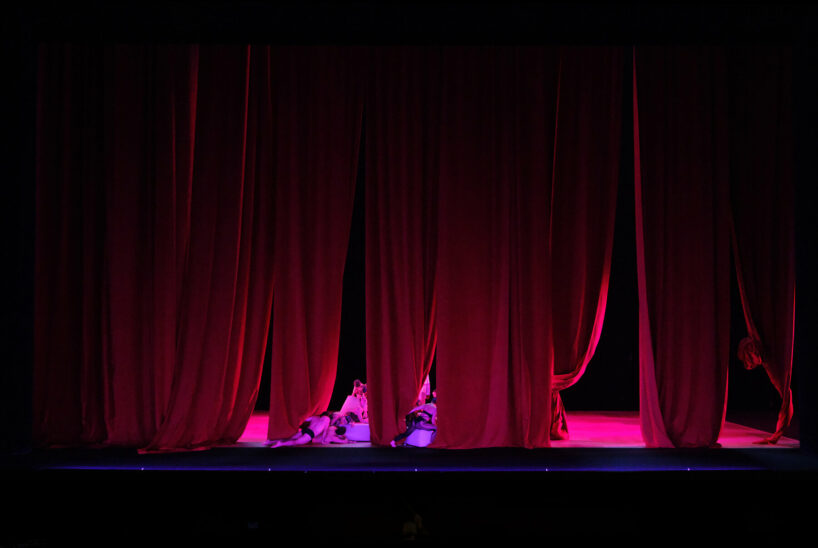
Act 2 – the pillars warp and the palace assumes a jungle-like character
